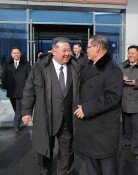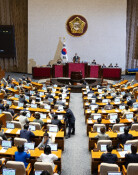Hyundai Steel shuts down plant as union demands bonuses
Hyundai Steel shuts down plant as union demands bonuses
Posted February. 26, 2025 07:23,
Updated February. 26, 2025 07:23
Hyundai Steel has shut down part of a cold rolling mill at its Dangjin steel plant in South Chungcheong Province. The company took this unprecedented step after its labor union repeatedly staged strikes, demanding performance bonuses equivalent to those at Hyundai Motor, a fellow affiliate within the Hyundai Motor Group. The lockout is the most forceful legal measure available to management in response to labor disputes.
Although the measure is limited to specific production lines, it marks the first time Hyundai Steel has ever imposed a lockout since its founding in 1953. The affected lines produce cold-rolled steel sheets for automobiles and home appliances, with an estimated daily output loss of 18,000 tons. Despite the production loss, the company decided on the shutdown because prolonged sporadic strikes by the Hyundai Steel Dangjin Hysco union—affiliated with the Korean Metal Workers' Union under the Korean Confederation of Trade Unions—had made normal plant operations impossible.
The union rejected the company's offer of a performance bonus package worth 26.5 million won per employee, including a payment equivalent to 450% of the base salary plus an additional 10 million won. Instead, it has been pushing for a package similar to Hyundai Motor's, which amounts to around 40 million won per worker. However, Hyundai Steel’s operating profit last year was just one-fifth of its 2022 level and only 40% of its 2023 figure. With its profit margin down to just 1%, the company argues that meeting the union’s demands would push its profit status into the red.
Compounding the crisis, the U.S. government has announced that starting next month, it will impose a 25% tariff on imported steel, including that from South Korea. This presents an unprecedented challenge for the entire Korean steel industry, including Hyundai Steel. In such a challenging economic climate, the union’s refusal to acknowledge the company’s and the nation’s struggles while prioritizing its own gains is unacceptable. Before management faces even severe difficulties, the union must abandon its excessive demands and cooperate to restore normal operations.







